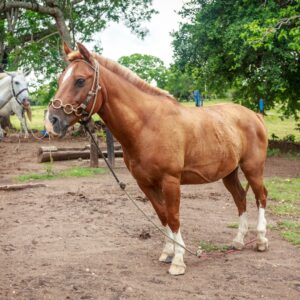 Restricting Forage Intake in Stubbornly Obese Horses: A medley of contributing factors can lead to obesity in horses. For example, overfeeding, sedentary lifestyle, genetics, and hormonal imbalances. Management of obesity involves evaluating every component of the diet and removing superfluous calories.
Restricting Forage Intake in Stubbornly Obese Horses: A medley of contributing factors can lead to obesity in horses. For example, overfeeding, sedentary lifestyle, genetics, and hormonal imbalances. Management of obesity involves evaluating every component of the diet and removing superfluous calories.
Once concentrated sources of calories, such as traditional feeds, are eliminated from the diet, forage sources must be scrutinized. “Not all forages are nutritionally identical. So, caloric density becomes important when choosing hay for certain horses, including those that are too heavy,” said Catherine Whitehouse, M.S., a nutrition advisor at Kentucky Equine Research.
Late-maturity hay should take the place of leafy, early-maturity hay. For example, as it generally has a lower energy content. In the same vein, for stubbornly obese horses, pasture intake must be strictly controlled or eliminated entirely. “Turnout is still important. It can be achieved through the use of a drylot or grazing muzzle, which slows consumption considerably,” Whitehouse said.
How much forage should be fed to a horse?
For healthy horses in moderate body condition on an all-forage diet, feeding 2% of body weight will generally maintain weight. Using this as a guideline, a 1,200-lb (550-kg) horse would be fed about 24 lb (11 kg) of forage per day. For obese horses resisting weight loss, however, this amount of forage might be too much, according to Whitehouse.
In these instances, use the supervision of a veterinarian and nutritionist. A revised ration should be employed, with hay or hay substitute fed at 1.5% of current body weight. “When forage is restricted to this extent, it is important to have a fairly accurate body weight of the horse. In addition, a reliable method to weigh the ration. This ensures consistent feeding from day to day,” Whitehouse said.
After eight weeks or so on this diet, if the needle has not moved on the scale or has moved minimally, the feeding rate can be dropped further, to 1.25% of body weight. Under most circumstances, horses should not be fed less than this daily.
Supplemental Benefits:
Horses maintained on all-forage rations should be supplemented with a well-formulated vitamin and mineral supplement. This will ensure horses receive all of the nutrients necessary for optimal health.
Dropping forage intake can induce problems in certain horses. Therefore, care should be taken to protect the gastrointestinal tract as well as possible. Proven gastrointestinal support should be offered in the form of stomach and hindgut buffers.
“Weight loss can be achieved, too, through a combination of diet modification and increased exercise, if the horse is sound enough to withstand exercise,” recommended Whitehouse. “Working up to 30 or 40 minutes of exercise five or six days a week can really make a difference in a horse’s weight, and some research indicates that the exercise will keep metabolic problems from occurring in vulnerable horses, even those that carry extra pounds.”
Resources:
In conclusion, do you have questions about Restricting Forage Intake in Stubbornly Obese Horses? Contact us at J & J Hay Farms by clicking here!
Article Sources: Kentucky Equine Research
